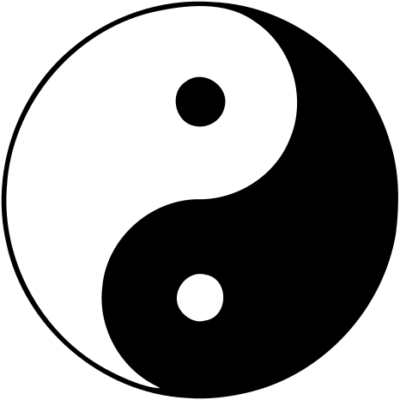Taoism is one of those world religions that sort of isn’t one. Many popular Chinese concepts are connected to Taoism and actually in many ways it’s like the Egyptian faith.
The basic principle is acceptance of and living with the natural way. Lao-Tzu was its unofficial founder and one of the immortals that are venerated, though that’s really true only of religious Taoism. As a matter of fact, like Buddhism the bulk of Taoist schools don’t deify anything. They adopted a lot of symbolism from the long since defunct Chinese religion of Bon, which is basically Chinese shamanism. The dancing dragon ceremony you may have seen and the foo-lions you might see in front of Chinese restaurants have their origin in Bon. Where the cat statues you see in Japanese places actually come from Shintoism or Japanese shamanism. They are tightly linked.
In Egyptian religion, the concept of ma’at or divine peace was personified as a goddess, and the great Tao (Tao means way) was also referred to as the great mother. The basic belief of Taoism is that we need not find our way through life, or make our way in life, but that this way already exists and that anything we would want to do or know would be in the Tao.
Much of the Chinese disciplines including feng-shui and kung-fu have Taoist origins, and the Buddhists adopted this concept because it seemed to mesh effortlessly with their teachings on the mind. Which many seem to mistake for agnosticism, but in fact there is no teaching for or against gods or other concepts in Buddhism. So the two philosophy/faiths don’t clash at all.
Interestingly, there is a small debate. Not an actual clash of debate, but in Buddhism clarity is sought and in Taoism they don’t believe it possible for clarity to be lost. They see confusion as a part of the Tao, and in the Tao when confronted with confusion there is a way that would lead to enlightenment. So Buddhism is a bit more rationalistic in that regard and ascetic.
Buddhism was also able to accept the teachings of Confucianism which was a doctrine of social justice and order, but Taoism and Confucianism clashed. In Taoism, there is a strong push for individuality. In Taoism, there is an emphasis of the personal Tao and acceptance of human nature. They see any legalistic sense of how to deal with human nature as ignorance of the Tao. Where as Confucianism is almost opposite. Confucianism was very progress oriented. Taoism sees that focus as being doomed to collapse.
In Taoism there is a concept called te or virtue. Unlike the communal concepts of Confucianism they speak of inherent virtue and don’t believe that you can cultivate what isn’t in you naturally. Te is linked to another concept, p’u, which roughly translates as “an uncarved block”. Something in its natural state. In Taoism, the only growth one can achieve is in harmony with your own Te, and if in any effort of self improvement you encounter resistance, it’s because it isn’t founded on your inherent virtue and thus goes against the Tao.
So, the Tao compared to Te is? Tao is the dynamic. Te is essence. Te is a constant. A component of the Tao like the strange attractor patterns in quantum physics. The i-ching oracle is of Taoist origin. It is a book of observations of the cycle of the Tao.
Your thoughts are welcome. Be well friends.
Travis Saunders
Dragon Intuitive
~science,mysticism,spirituality~

